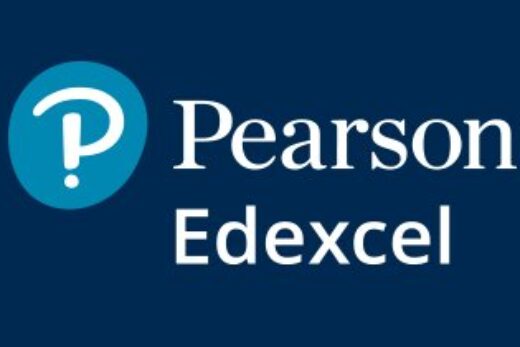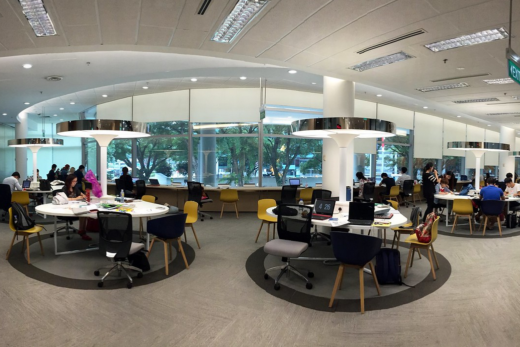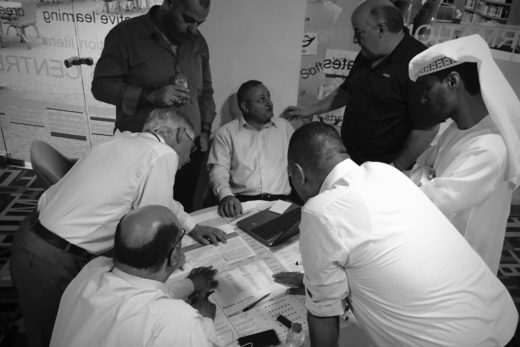The team explores emerging technologies, cultivates future-ready skills, and activates interdisciplinary collaboration to shape interactions and insights that positively impact society.
When Jesus Franco Yescas started his undergraduate classes at Arizona State University (ASU) in informatics, he dreamt of taking that degree even further. He wanted a program where he could not only use technology to conceptualize a better future for himself and others but one where he could create it.
Now, Franco Yescas is among the first cohort within the Media Arts and Sciences (Extended Reality Technologies) master’s program, where he is learning to develop the technologies and software used to create virtual worlds and immersive experiences.
In addition to his studies, he also puts his passion for computer science and creativity to work at ASU’s Next Lab — joining a team of studio associates who chart the future of skills and technology.
“The growth I’ve had while working at Next Lab isn’t only technical skills like programming and coding,” he said. “I’ve also gotten to do public speaking and learned to work with teams.”






Formerly known as Learning Futures, the team at Next Lab is reimagining how they advance the future technology and skills required to power next-gen solutions — such as spatial computing, artificial intelligence, 5G networks, and immersive technologies.
“We’re building upon the success of Learning Futures and setting our sights on areas of technology that are poised to impact society significantly,” shares Dan Munnerley, executive director of Next Lab.
Learning Futures was instrumental in contributing to ASU’s innovation, including the conceptual development and design of Dreamscape Learn’s immersive learning lab and the creation of the Zoom Innovation Lab, a first-of-its-kind partnership that combines ASU’s world-class education with Zoom’s industry-leading technology.
Today, Next Lab is taking a reimagined approach to creating what’s next for a digitally enhanced society. With a focus on three areas — exploring emerging technologies, cultivating future-ready skills, and activating interdisciplinary collaboration — Munnerley notes the team focuses on “bridging the gap between imagination and reality.”
Charged with creating what’s next, now
Critical to advancing work is empowering a community of future-focused thinkers and creators to imagine, build, and play with technologies to shape society positively. Working with teams across the university, community groups, and industry leaders, Next Lab can identify ways to enhance interactions with emerging technology.
“When an idea is introduced to the Next Lab, it goes through a series of steps in a future-focused design process unique to the Lab,” says Munnerley. The process includes:
- Establishing transdisciplinary collaboration to ensure a diversity of thought, experience, and values are brought together to surface the ultimate impact – upwards of seven generations into the future.
- Exploring emerging technologies – new, emerging, and not yet in existence – with a lens toward positively impacting society.
- Cultivating future-ready skills by bringing together groups of experts and students to form specialist guilds to design and develop new ideas and proof-of-concepts.
Next Lab works from the creative studio space on the second floor of Creativity Commons on ASU’s Tempe campus.
That’s where you’ll find Franco Yescas most days, working alongside fellow Management Intern Amanda Federico to guide a team of 40 students – known as studio associates – in the design and development efforts.
Organized into seven guilds, these communities of practice form around a future skill, including 3D modeling and animation, game development, digital storytelling, and cloud infrastructure.
When reflecting on past projects, Franco Yescas talks about Huddle, a virtual reality learning environment he worked on to immerse students in new environments. “The instructor puts up prompts and models [into the virtual environment] that the students can interact with and look at while they explain the concept,” Franco Yescas explains.
In fact, last year, ASU students in an HST 130 course explored the terrains of World War I from inside Huddle.
“Making these experiences is kind of a dream job to me,” Franco Yescas shares. “So I really do feel lucky having this as my first job.”
Toby Vaughn Kidd and Bea Rodriguez-Fransen, Ed.D. are also co-founders, key contributors, and leaders of the Next Lab.
Keep up with creating what’s next at ASU and beyond at nextlab.asu.edu and follow along on LinkedIn.



